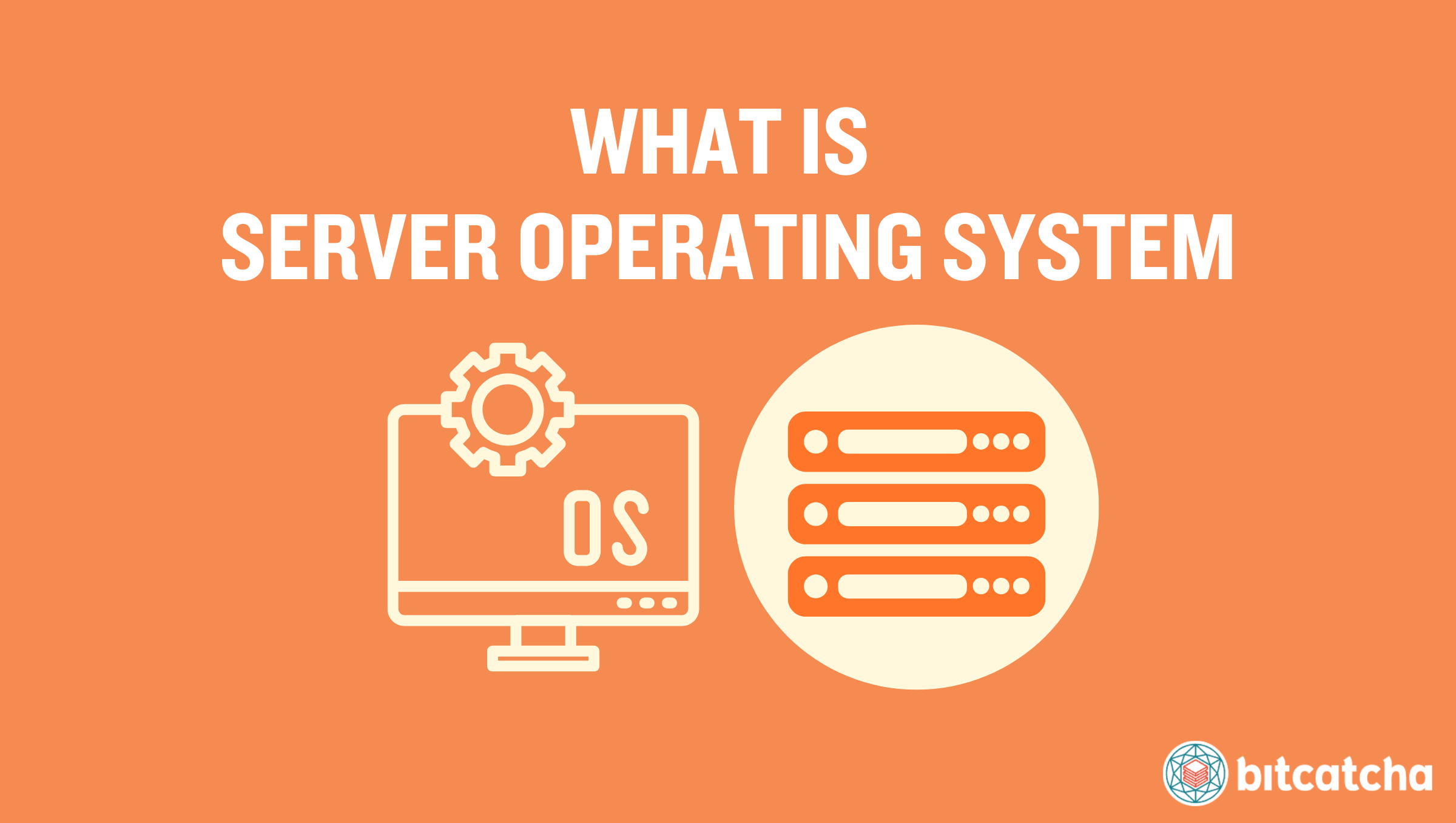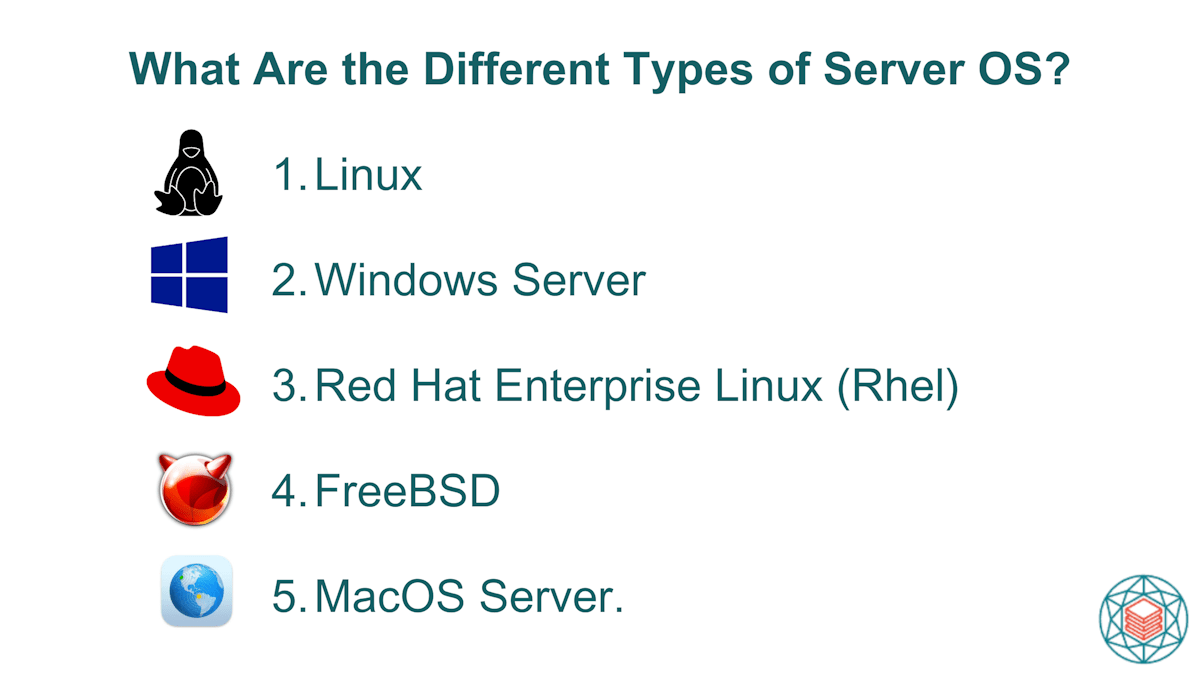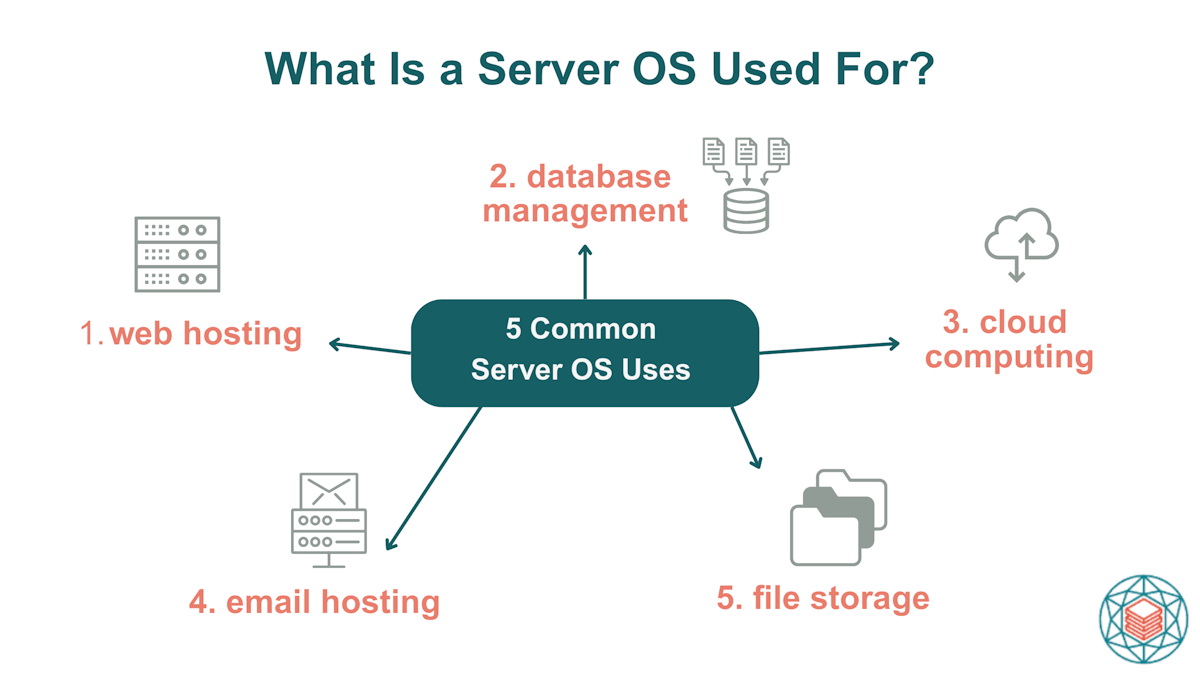A server operating system (OS) refers to the specialized software that manages and coordinates server hardware and enables it to run applications and services. 5 essential OS features are multi-user access, networking tools, security controls, scalability, and automation. The 5 most common types of server OS are Linux, Windows Server, Red Hat Enterprise Linux (RHEL), FreeBSD and macOS Server.
5 common uses of a server OS include website hosting, managing databases, supporting cloud computing, handling email services, and storing files. The choice of server OS determines the hosting environment and what software it is compatible with. 3 important areas of software compatibility are runtime environment, programming languages and databases. A runtime environment provides the system resources, libraries, and dependencies required for applications to function. Programming languages determine how software is developed and executed on different OS platforms. Databases are critical for managing structured data. Understanding these factors and the differences between Linux and Windows hosting helps businesses choose the most suitable server OS for their use case.

What Is a Server Operating System?
A server operating system is specialized software designed to manage server hardware and coordinate network resources in a way that supports certain services. The server OS is directly installed on the server hardware and forms the foundation for the server to run. The OS provides a stable and secure environment and efficiently handles connections and workloads.
It is the server operating system that enables servers to function as different server types, including web servers, file servers, database servers, and mail servers.
What Are the Features of Server OS?
A server OS has 5 main features. The first is multi-user access, which allows multiple clients to connect simultaneously. The second is built-in networking tools for handling data transfers, domain management, and firewall configurations. The third is advanced security features like user authentication, encryption, and access controls. The fourth is scalability, which enables businesses to upgrade software and hardware resources as needed. The fifth is automation and scripting capabilities for efficient server management.
What Are the Different Types of Server OS?

The different types of server OS refer to variations of server OS categorized by attributes such as architecture, security, compatibility, performance, and licensing. There are 5 different types of server OS:
- Linux
- Windows Server
- Red Hat Enterprise Linux (Rhel)
- FreeBSD
- MacOS Server
1. Linux
Linux is an open-source server operating system built for high-performance computing, resource efficiency, and process isolation. It supports multi-user environments, advanced file systems like ext4 and XFS, and security frameworks such as SELinux and AppArmor. 6 popular Linux distributions are Ubuntu Server, Debian, Fedora, AlmaLinux, openSUSE, and SUSE Linux Enterprise. Each offers different package management systems like APT, DNF, and Zypper. Linux has strong compatibility with containerization technologies like Docker and Kubernetes.
2. Windows Server
Windows Server is a proprietary operating system developed by Microsoft for enterprise workloads, web hosting, and application deployment. It supports Windows-based technologies such as ASP.NET, Microsoft SQL Server, and Active Directory for centralized authentication. Core features include the NTFS file system, Hyper-V for virtualization, and Windows Admin Center for remote management. Windows Server also integrates with Microsoft services like Azure and Exchange and offers automation tools like PowerShell. It’s a reliable choice for businesses that require Microsoft ecosystem compatibility.
3. Red Hat Enterprise Linux (RHEL)
Red Hat Enterprise Linux (RHEL) is a commercial Linux operating system designed for enterprise workloads, cloud computing, and virtualization. It provides long-term support, security updates, and access to Red Hat’s professional technical assistance. RHEL supports advanced file systems like XFS, built-in SELinux security policies, and containerization tools like Podman and OpenShift. It is widely used by businesses that require certified software, regulatory compliance, and enterprise-grade security.
4. FreeBSD
FreeBSD is a Unix-like operating system optimized for high-performance networking, security, and process isolation. It features the ZFS file system for data integrity, the PF firewall for traffic filtering, and the Jails system for lightweight virtualization. FreeBSD includes a built-in package management system (pkg) and a Linux binary compatibility layer for running Linux applications. Its permissive BSD license allows for unrestricted modifications and distribution.
5. MacOS Server
macOS Server is a Unix-based operating system designed for managing macOS and iOS devices in enterprise environments. It runs on the Darwin kernel and includes standard Unix tools, automation with launchd, and directory management through Open Directory and Profile Manager. Apple has discontinued macOS Server as a standalone product, but some server functionalities remain available in macOS. macOS Server is rarely used for traditional web hosting due to limited support for common web hosting technologies and third-party server applications.
What Is a Server OS Used For?
A server OS is used to manage server hardware and software in a way that enables the server to perform highly specific functions. 5 common server OS uses are web hosting, database management, cloud computing, email hosting, and file storage.

Web hosting relies on a server OS to process HTTP requests, run web server software like Apache or Nginx, and manage security configurations. Database management depends on a server OS to store, retrieve, and secure structured data using database systems like MySQL, PostgreSQL, or Microsoft SQL Server. Cloud computing requires a server OS to enable virtualization, manage containers, and allocate computing resources dynamically. Email hosting functions through a server OS that runs mail servers like Postfix or Microsoft Exchange, handles message storage, and manages spam filtering. File storage depends on a server OS to control networked data access, implement backup solutions, and manage distributed file systems like NFS or SMB.
Does Choice of Server OS Impact Web Hosting?
Yes, the choice of server OS impacts web hosting because server OS determines the hosting environment. The hosting environment refers to the underlying system that manages server resources, controls software execution, and supports web technologies. Web hosting plans that run on Linux are known as Linux hosting, while those using Windows Server are called Windows hosting.
The hosting environment determines software compatibility, thereby defining which technologies the hosting customer has the option to use. The choice between Linux vs Windows hosting also impacts overall cost, as Linux is open-source while Windows Server requires paid licenses for proprietary software.
How Does Server OS Affect Software Compatibility?
A server OS affects software compatibility by determining which server management tools, runtime environments, programming languages, and databases are supported by the web hosting plan. Web hosting using Linux OS offers greater flexibility with open-source software. Web hosting using Windows server ensures compatibility with Microsoft-based applications. For example, Linux hosting supports popular control panels like cPanel and Webmin, while Windows hosting typically uses Plesk.
What Is a Runtime Environment?
A runtime environment provides the system resources and dependencies required to execute applications on a web server. It defines how software interacts with the OS and manages execution. In web hosting, the server OS functions as the base runtime environment that determines which applications can run. Web hosts also support additional, specialized runtime environments layered on top of the OS to support specific applications or frameworks. For example, Linux hosting supports runtime environments like PHP-FPM, Node.js, and Docker, while Windows hosting runs the .NET runtime and IIS.
What Are Programming Languages?
Programming languages are the structured set of instructions that form the foundation of web applications. They define how code is written, executed, and interpreted by a server. A server OS affects which programming languages a hosting plan is able to fully support. Linux hosting is best for PHP, Python, and Ruby due to built-in support, performance optimizations, and open-source libraries. Windows hosting is optimized for C#, ASP.NET, and PowerShell, offering deeper integration with Microsoft tools. Some languages run on both but may perform differently. For example, Java applications may require additional configuration on Windows servers.
What Is a Database?
A database stores and manages structured data for web applications. The server OS determines which databases are natively supported and how they interact with web applications. Linux hosting supports databases like MySQL, PostgreSQL, and MariaDB, commonly used in open-source applications like WordPress and Drupal. Windows hosting is built for Microsoft SQL Server, which integrates with .NET applications and enterprise solutions.
